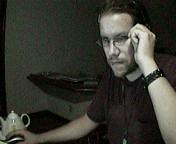I'm going to include a post of mine to
SL4. This is because it encapsulates an opinion of mine rather well, and I have no wish to rehash the topic. This occurred because of a discussion on the above forum, where it was claimed that psycho-active substances, such as DMT, LSD, or non-hallucinagins such as MDMA, could represent a method of 'mind-expansion' or creative enlightenment. I am not opposed to drug use, I see it as a victimless activity, and people should be allowed to do whatever they wish to themselves if they possess an understanding of the consequences.
What I am opposed to, is irrational behavior, and misrepresentation of irrational behavior as superior to, or even alternative to, rational thought and behavior. With that in mind, I'm going to repost my rebuttal to an apologist for mind-expansive drug use. In an earlier post, he basically re-submits Dr. Leary's suggestion that hallucinagins can function on the level of a re-organization of mental state, which can have beneficial effects in terms of insights, moral transcencion and lasting attitude adjustment. my reply follows.
-----------------------------------------------------------------------------------
I am not a neurochemical professional, even so, as an interested bystander,
I am struck by the way that this thread has progressed, with very little
attention having been given to the relative biological danger inherent in
most of the drugs under discussion.
MDMA and it's parent MDA, which David Cake upholds as "quite reasonable for
particular purposes" is a stimulant, and a relative of the extraordinarily
negative Methamphetamine or "Crystal Meth". Even excluding the research of
Dr. George Ricaurte of John Hopkins, which suggests that significant
'structural' damage is incurred through MDMA use over time, we know that
MDMA plays a major role as a serotonin re-uptake inhibitor, and the
relatively negative neurochemical effects of this are well documented.
In order to explain my objections to LSD, often touted as a very safe drug,
as it is neither openly neurotoxic, nor does it have well understood side
effects, I'm going to adopt a more narrative tone. Having been involved with
drugs in my youth, I can say with some certainty that there are few, if any,
effects, culture, or side-effects of common psychoactive drugs which I have
not experienced or witnessed first-hand. This experience makes me doubt
people who use arguments to the effect of "If you haven't tried drugs, you
can't talk about them". In my experience, people who are involved in drugs
gain no special knowledge of the safety, chemical aftereffects, or effect
upon intelligence of the drugs, which they believe they are electing to
experience.
These "observers" are collecting their special information with minds that
they are simultaneously dosing with unknown levels of psychoactive drugs,
many of which are psychologically and physically addictive. The mind is a
delicate thing. Our primitive cerebrums only weakly support rationality
under the best conditions, and screwing around with hormonal or chemical
balances within that complex system has predictable results. Most drug users
I have observed are under the impression that the insights they produced
while under the influence of psychoactive substances were intensely moving,
complex and significant, and that as they 'come down' they lose the ability
to appreciate or comprehend their previous insights. Some of their
conclusions are, I submit, very weird. Few appeared to me to be either
coherent or inspired instead appearing as permutations, distortions or even
perversions of earlier insights held by the user, or at best irrational
concatenations.
The claim of LSD "opening up one's mind" or allowing "new insights" is a
result I lay mostly upon the fact that it functions both as a seratonin
analogue and increases dopamine production significantly. Both of these
clinical effects lead towards premature, unwarranted and precipitate
instigation of mental closure, which leads the subject to assume that since
mental closure is reached, a conclusion must have been forthcoming. Since
memories are filed according to the observer�s interpretation of events, the
subject remembers such moments as possessing great clarity and insight, when
in fact the biological structures for detecting clarity of thought and
mental completion are merely being triggered inappropriately.
The negative side affects of LSD (other than it appears not infrequently
to
inspire irrational behavior and beliefs, bad-trip nightmares,
self-mutilation, and dangerous behavior) lie in the fact that it functions
both as a serotonin re-uptake inhibitor, and is psychologically addictive.
(I consider most addictions to be bad news, as they introduce irrational
behavior, and introduces a new thought factor not grounded in reality basis,
aside for the desire to repeat the experience).
This above discussion ignores the fact that most psychoactive substances
are
illegal in many countries, and because of this available drugs tend to be
of
uncertain composition, and often arbitrary dosage. The wisdom of ingesting
completely unknown substances advertised as psychoactive drugs, obtained
from people who smuggle, steal, murder, and occasionally write incoherent
poetry is a decision, which under these circumstances cannot be entirely
separated from the inherent toxicity of the supposed makeup of said drugs.
(replies and criticisms welcome)
-----------------------------[END]------------------------
Some editing for grammar, syntactic inclarities, and spelling.
